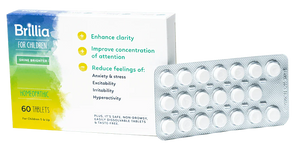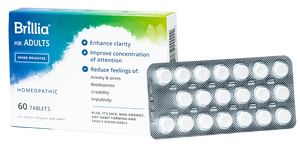Researchers estimate that about 70 percent of adults with ADHD experience difficulties with emotional regulation, and many do not have a co-occurring condition that would otherwise explain this connection.1 Children with attention issues may also experience emotional dysregulation; a 2016 study found a correlation between ADHD symptoms and heightened emotions in youngsters.2
Signs of emotional dysregulation vary, but may include low frustration tolerance, irritability, overreacting, mood swings, and feeling unable to calm oneself down. Here is what the research says about how they are connected and what you can do to get help.
Strong Emotions & ADHD: Is There a Connection?
Though most people associate ADHD with symptoms like hyperactivity, inattention, and impulsivity, difficulty managing emotions is just as common. Experts believe that all of these symptoms stem from the part of the brain that controls our executive functions.
Executive functions refer to the skills that help us plan, pay attention, remember, control our impulses, transition, shift perspective, manage how we respond to situations, and control our emotions. Brain imaging studies have proven that people with ADHD have weaker function in the prefrontal cortex and right hemisphere of the brain, where these executive functions live.3
Thinking of Exaggerated Emotions as an ADHD Symptom
Despite its prevalence, emotional dysregulation is not listed as part of the diagnostic criteria for ADHD in the DSM-5, the reference used by professionals to identify mental health conditions. However, experts believe this criteria may evolve to include this common symptom as more studies emerge on why this connection occurs.4
Because emotional dysregulation is often ignored as a core symptom of ADHD, many individuals get misdiagnosed with another mental disorder like depression, bipolar, borderline personality, and even posttraumatic stress disorder (PTSD).5 Yet, studies show that many of the same treatments used to reduce ADHD symptoms, such as mindfulness, can also improve emotional regulation.6 Thinking of exaggerated emotions as a symptom of ADHD can help more individuals be properly diagnosed and get the help they need.
ADHD Amplifies Everything
Billy Roberts, a therapist and founder of Focused Mind ADHD Counseling, tells Healthline, “Simply put, ADHD takes away the brain’s pause button.” When a person with ADHD feels an emotion, they do so quickly and intensely, and they are more prone to express exaggerated feelings publicly than someone without ADHD.7 Oftentimes, their impulsive display of emotions is followed by regret once they calm down and rationally assess whatever occurrence led to the outburst. If we think of ADHD as an issue pertaining to self-regulation, it’s easier to see the connection: just as one might have difficulty regulating their attention, they can just as easily have difficulty regulating their emotions.
How to Treat Emotional Challenges
From establishing a mindfulness practice to trying medication, there are various ways to treat emotional challenges at the same time as treating other core symptoms of ADHD. Here are a few:
- Practice mindfulness: Mindfulness practices such as meditation, deep breathing, and yoga have been proven to help regulate emotions by encouraging practitioners to observe what they’re feeling without judgment and choose how to act instead of reacting impulsively.8
- See a therapist: A trained counselor or psychotherapist can help you understand how and why strong emotions arise as well as give you tips on how to manage your emotions in a healthier way. Dialectic behavioral therapy (DBT) is one type of therapy that teaches patients concrete skills to help them regulate their mood and emotions.
- Get back to basics: Sometimes something as simple as skipping breakfast or staying up too late can make a person more prone to emotional outbursts. Be sure to follow a healthy diet, get adequate sleep, exercise regularly, and prioritize self-care to help regulate your emotions. Also be sure that you’re not overusing screens, as excessive screen use can also increase stress and interfere with sleep.
- Try medication: If you are already taking stimulant medication for ADHD, it’s useful to know that a common side effect of these pharmaceuticals is anxiety. This symptom can be even more problematic if you already have trouble regulating your emotions, as anxiety can make them more intense. Taking a homeopathic medication like Brillia® alongside ADHD medication or alone can help reduce anxiety, help with mood regulation, as well as other symptoms associated with ADHD like impulsivity, restlessness, hyperactivity, inattention, and irritability. Free from synthetic chemicals and harmful side effects, Brillia stops these symptoms from occuring in the body through targeted antibodies without affecting any other systems in the body while enhancing focus and clarity in both children and adults.
Not every person with ADHD experiences heightened emotions, but when they arise it’s important to know that this symptom is not abnormal. Educating yourself on all aspects of ADHD and learning tips on how to thrive with an attention disorder can help you tap into your own unique superpowers like creativity, hyperfocus, and increased compassion, which can actually be a result of feeling intensely.
To learn more about how to manage emotions through healthy lifestyle practices, visit the Brillia(nce) Resource Center.
Get a whole bunch of support right in your inbox.







